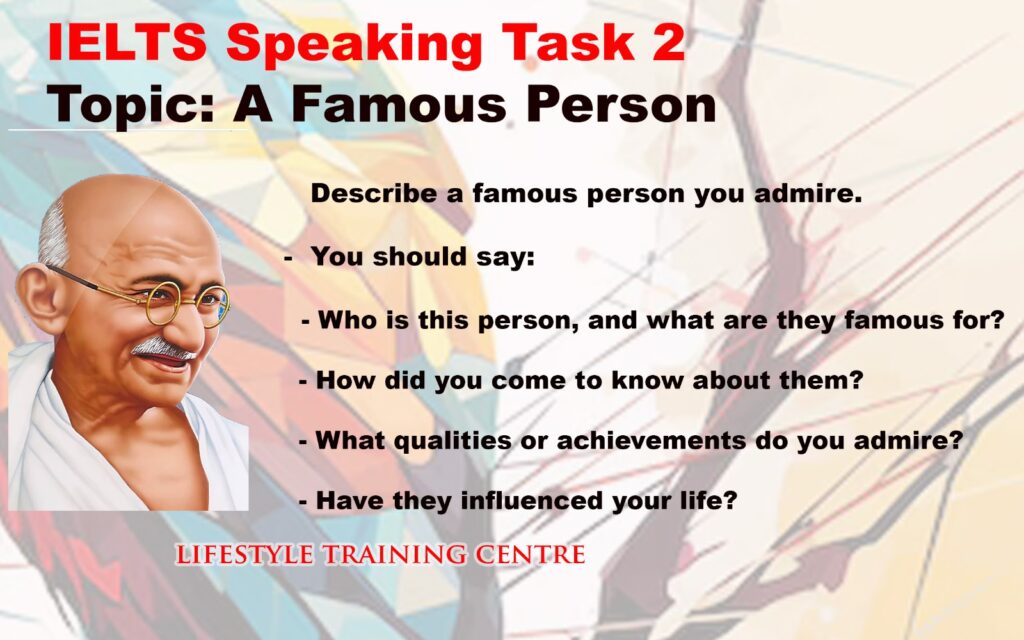Question 36: Describe a famous person you admire.

Watch this on YouTube:
Model answer by Lifestyle Training Centre
I’ve read, learned, and heard about many distinguished individuals who have done valiant and admirable things in their lives. Among these, Mahatma Gandhi’s life story particularly captivates me. Gandhi is celebrated for his pivotal role in Indian politics, especially in the monumental struggle to overthrow the British colonisers from Indian soil.
I first learned about Gandhi through history lessons in school and later through various books, documentaries, and films that detailed his life and contributions. His name is often cited among a distinguished few global leaders who have made an indelible impact on society and the world through peaceful means.
What I admire most about Gandhi, among his extraordinary qualities and unparalleled achievements, is his unwavering dedication to non-violence even in the face of brutal oppression. Gandhi’s ability to mobilise millions without wielding a sword or pulling a trigger, advocating instead for peaceful resistance and civil disobedience, was both remarkable and inspiring. He embodied and practiced love, compassion, and tolerance, principles that have left an indelible mark worldwide. His teachings on simplicity, self-reliance, and humility continue to resonate deeply with people around the world.
Gandhi’s non-violent and humble lifestyle has had a profound impact on me, illuminating my path and urging me to eschew violence and pride. I am confident that his legacy will continue to inspire and enlighten many more lives in the years to come. If only people, societies, and even countries endeavour to embody just a fraction of the values and principles Gandhi exhibited, the world would undoubtedly be a better place.
List of vocabulary used:
- Distinguished: /dɪˈstɪŋɡwɪʃt/ – Recognized for excellence or achievement.
- Valiant: /ˈvæliənt/ – Possessing or showing courage or determination.
- Admirable: /ˈædmərəbl/ – Deserving respect and approval.
- Captivates: /ˈkæptɪˌveɪts/ – Attracts and holds the interest and attention of.
- Celebrated: /ˈsɛlɪbreɪtɪd/ – Widely known and praised.
- Pivotal: /ˈpɪvətl/ – Of crucial importance in relation to the development or success of something.
- Monumental: /ˌmɒnjʊˈmɛntl/ – Great in importance, extent, or size.
- Overthrow: /ˌəʊvəˈθrəʊ/ – Remove forcibly from power.
- Colonizers: /ˈkɒlənaɪzəz/ – People or countries that establish political control over another country or area.
- Indelible: /ɪnˈdel.ə.bəl/ – Making marks that cannot be removed; unforgettable.
- Non-violence: /nɒn-ˈvaɪələns/ – The practice of advocating one’s own or others’ rights without physical aggression.
- Oppression: /əˈprɛʃ(ə)n/ – Prolonged cruel or unjust treatment or control.
- Mobilize: /ˈməʊbɪlʌɪz/ – Prepare and organize (troops or people) for active service.
- Wielding: /wiːldɪŋ/ – Holding and using (a weapon or tool).
- Advocating: /ˈadvəkeɪtɪŋ/ – Publicly recommending or supporting.
- Resistance: /rɪˈzɪst(ə)ns/ – The refusal to accept or comply with something.
- Civil disobedience: /ˈsɪv(ə)l ˌdɪsəˈbiːdiəns/ – The refusal to obey certain laws or governmental demands for the purpose of influencing legislation or government policy.
- Embodied: /ɪmˈbɒdɪd/ – Represented in physical form; personified.
- Compassion: /kəmˈpæʃ(ə)n/ – Sympathetic pity and concern for the sufferings or misfortunes of others.
- Tolerance: /ˈtɒlərəns/ – The ability or willingness to tolerate something, particularly opinions or behavior that one does not necessarily agree with.
- Simplicity: /sɪmˈplɪsɪti/ – The quality or condition of being easy to understand or do.
- Self-reliance: /ˌsɛlf rɪˈlaɪəns/ – Reliance on one’s own powers and resources rather than those of others.
- Humility: /hjuːˈmɪlɪti/ – A modest or low view of one’s own importance; humbleness.
- Resonate: /ˈrɛzəneɪt/ – Evoke or suggest images, memories, and emotions.
- Profoundly: /prəˈfaʊndli/ – To a great depth psychologically.
- Illuminated: /ɪˈljuːmɪneɪtɪd/ – Light up; clarify or explain.
- Eschew: /ɪsˈtʃuː/- Deliberately avoid using; abstain from.
- Conflict resolution: /ˈkɒnflɪkt ˌrɛzəˈluːʃ(ə)n/ – The process of resolving a dispute or a conflict by providing each side’s needs and adequately addressing their interests.
- Empathy: /ˈɛmpəθi/ – The ability to understand and share the feelings of another.
- Principles: /ˈprɪnsɪp(ə)lz/ – Fundamental truths or propositions that serve as the foundation for a system of belief or behavior.
- Legacy: /ˈlɛɡəsi/ – Something transmitted by or received from an ancestor or predecessor or from the past.
- Enlighten: /ɪnˈlaɪt(ə)n/ – Give (someone) greater knowledge and understanding about a subject or situation.
- Purpose: /ˈpɜːpəs/ – The reason for which something is done or created or for which something exists.
- Integrity: /ɪnˈtɛɡrɪti/ – The quality of being honest and having strong moral principles.
- Service: /ˈsəːvɪs/ – The action of helping or doing work for someone.
Free admission and English Courses. കാശ് കൊടുക്കാതെ അഡ്മിഷൻ. FREE ഇഗ്ലീഷ് കോഴ്സുകൾ. ഈ ഓഫർ നേടൂ. Contact us at +91 9886926773 പ്രോസസ്സിംഗ് ആയാസകരം.

New batch is open. Join today!

Ready to study abroad or master OET, PTE, IELTS, Duolingo, Phonetics, or Spoken English?
📞 Call us now at +91 9886926773
📱 Call/WhatsApp/Text: +91 9886926773
📧 Email: mail@goltc.in
Visit us in person by following the directions on Google Maps. We look forward to welcoming you to the Lifestyle Training Centre.
Follow Lifestyle Training Centre on social media:
Thank you very much!
